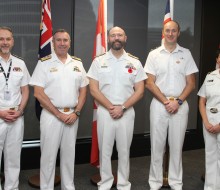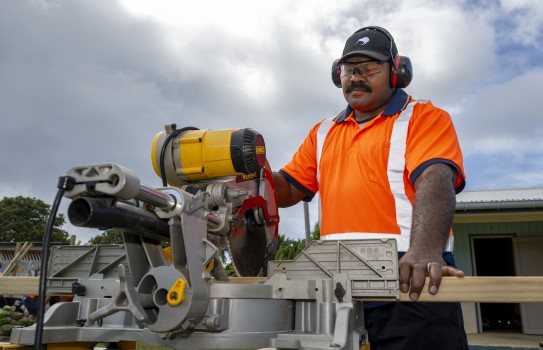
Five Eyes strategic navy talks conclude in Wellington
14 November 2025
Unfortunately you are viewing this website on an outdated browser which does not support the necessary features for us to provide an adequate experience. Please switch to a modern browser such as latest version of Google Chrome, Mozilla Firefox, Apple Safari or Microsoft Edge.
Ngā mihi nui
Republic of Fiji Military Forces (RFMF) engineer Sapper Sakaraia Tukuca has served in the Middle East several times but is relishing his latest deployment in his Pacific neighbourhood.
The carpenter with Engineers Regiment 1 Construction Squadron is taking part in the New Zealand Defence Force-led Exercise Tropic Twilight, an annual exercise funded by New Zealand’s Ministry of Foreign Affairs and Trade.
This year it is being carried out on the small island of Ma’uke in the Cook Islands, where more than 30 personnel are involved. The island has a population of about 240.
The NZ Army’s 25 Engineer Support Squadron, 2 Engineer Regiment is being supported by a medical team and troops from Australia, Fiji, Tonga and Vanuatu.
The team is carrying out maintenance and improvements on the island’s solar farm, water infrastructure, school and halls.
Sapper Tukuca enlisted in the RFMF in 2009 and has since deployed to Middle East several times, including Syria and Sinai. He also went to Vanuatu following a cyclone in 2023.
He joined 2 Engineer Regiment at Linton Military Camp, near Palmerston North, early in September for pre deployment training before the contingent was flown to Ma’uke by Royal New Zealand Air Force C-130J Hercules.

Republic of Fiji Military Forces engineer Sapper Sakaraia Tukuca is gaining valuable experience taking part in the New Zealand Defence Force-led Exercise Tropic Twilight, in the Cook Islands.
He said he was gaining valuable experience by working alongside the NZ Army engineers and those from the other nations.
“I very much like it. It feels good because the experience of overseas deployment, especially working with the foreign guys.
“I have learned a lot and the people have been really welcoming. I have really enjoyed the food too.”
The NZ Army’s Corporal Richard McLaren is the carpentry team lead for Tropic Twilight and said the benefits of embedding other nations flowed both ways.
“I’ve never had an international partnership under my command before. This helps me and the boys communicate with other nationalities. And the Pacific guys obviously benefit from this work as well.
“There’s a little bit of a language barrier to begin with, but we learn to adapt to that and we can communicate well enough to get the job done.
“It’s also nice to work with other nations and to see their culture. We got shown how to husk a coconut and learn a little about how they collect food. That was pretty cool.”